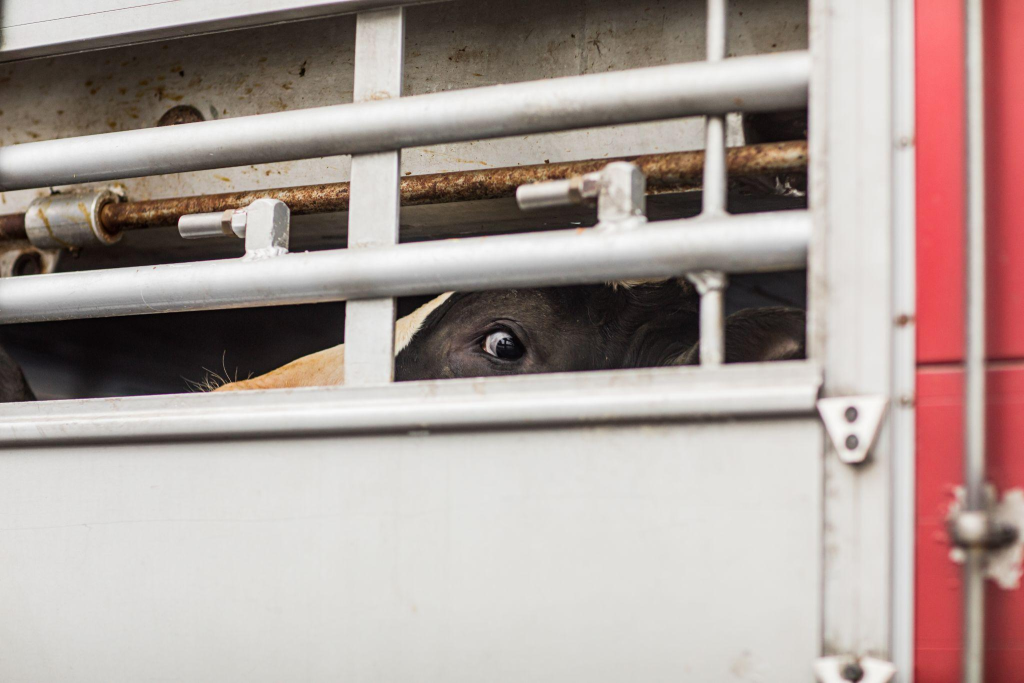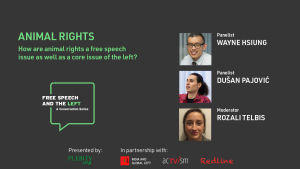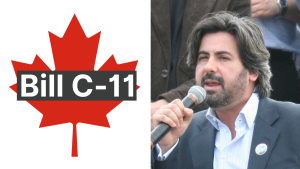
A terrified cow looks through an opening from the inside of a transport truck arriving at a Dutch slaughterhouse. Credit: Dario Endara / We Animals Media
Open dialogue is an important tool for moving discourse forward and gaining a better understanding of the issues we face in our time. In the spirit of open dialogue, the following is my response to the essay Animal Rights and the Challenge of Activism.
In the essay, the author describes the different tactics used by animal rights activists to persuade non-vegans. She emphasizes the importance of free speech, open inquiry, and debate, in particular the importance of non-vegans’ ability to challenge vegans. But in doing so, she also unwittingly exposes how her own rhetoric might influence people in such a way that might undermine the animal rights movement. My response isn’t an attempt at a ‘take-down’ of the author, but instead it is a way to show how important language is in animal rights activism and how even those of us with the best intentions can fall into these traps.
The ‘Pick Me Vegan’
The author opens her essay with the dated joke, “How do you know someone is vegan…” — well, we all know the punch line. She pokes fun at the stereotype of the annoying vegan, but then spends the rest of the essay reassuring the reader that she is actually not like one of those pushy vegans she jokes about from the outset. But in an effort to make herself appear more palatable to non-vegans, the author may actually be undermining the animal rights movement altogether.
She calls PETA’s ‘The Holocaust on Your Plate’ campaign off-putting and even “damaging for the movement.” She writes that, “[a]nimal rights activists displaying the injustices of slaughterhouses in public often seems to have the opposite effect, putting people off the cause,” despite absolute lack of evidence suggesting this to be true (and ignoring all of the anecdotes of people who went vegan overnight because they viewed animal agriculture footage).
Further on she writes that she believes the main challenge facing the animal rights movement is its associated baggage of identity. She writes, “no one wants to be identified with the militant vegan.” But by using the same language that non-vegans use to dismiss veganism, she legitimizes and reinforces these stereotypes. She concedes that there is such a thing as a ‘militant vegan’ and that being one is undesirable and off-putting. Additionally, how one might define a ‘militant vegan’ depends entirely on one’s own subjective perspective. Everyone will have their own definition–and some may be more charitable with their definition than others. This term is unhelpful and only perpetuates the stereotype of the pushy vegan that the author clearly seeks to avoid as a label for herself.
By reinforcing these stereotypes, she’s giving non-vegans permission to continue their support of cruelty without the added guilt.
Some might describe the above tactics as ones that are associated with the ‘Pick Me Vegan.’
Like the ‘Pick Me Girl’, the ‘Pick Me Vegan’ downplays his or her own beliefs as a way to separate themselves from those other ‘annoying vegans’ and reassure you that they are not like them. They are apologetic and passive, and they assert that “veganism is a personal choice.” The notion of something being a ‘personal choice’ is commonly espoused by cultural relativists. But this stance is what is truly doing a disservice to the animals. Any action stops being a personal choice when there is a victim involved. In this case, the victims are the animals. And when you have ‘Pick Me Vegan’ celebrities and influencers spout the same language, this language becomes more normalized and widely accepted. This rhetoric makes it more challenging for those who actually seek change and makes the unapologetic vegan appear more radical and unhinged than they are. It reaffirms animal consumption as the default behavior and veganism as an anomaly.
‘Pick Me’s’ tend to state that we should not ‘shove our views down people’s throats’ though it should be noted that food brands do this every single day in various ways. In the United States, fast food advertisements are the most viewed food/beverage ads by children. At the end of 2018, Olive Garden had the most ads among related food brands on TV in the U.S. followed closely by Domino’s Pizza and Longhorn Steakhouse. Domino’s spends the most on advertising above all other restaurants, followed by McDonalds, Subway and Taco Bell. Nestle spends billions on advertising annually in the United States alone. Coca-Cola spends the most on advertising among beverage brands.
These companies spend billions of dollars to coax us to fill our bodies with poison, but they are never told to ‘stop forcing their views on others.’ For companies, it’s simply called advertising. For individuals, it’s called ‘forcing your views.’ Ordinary people who reveal uncomfortable truths are seen as scapegoats and labeled ‘militant.’ There is immense social pressure to downplay the truth in order to make others feel less bad about their choices that impact others.
The Pick Me Vegan’s main goal is not to be a voice for the voiceless but rather to seek the approval of non-vegans. And failing to be consistent with their convictions may actually be less effective than the PETA campaign that the author deemed as being “harmful for the movement.” She sees harsh truths as being ‘harmful’ when the real harm on display here is the mass scale murder of animals at the hands of humans every single day in every corner of the world.
Further on, the author writes that the ability of non-vegans to engage vegans in open discourse is itself a key component to affecting change in the animal rights movement. She writes, “If people weren’t able to criticize vegans and challenge their arguments, nothing would change.” But in doing so she is still toeing the line, catering to non-vegans at the expense of the movement, seeking to score social points and stay on non-vegans ‘good side’ rather than truthfully exposing the realities of animal exploitation.
A critical component to changing minds is the language vegans use, not the criticisms that come from non-vegans.
It’s tempting to be a ‘Pick Me’ with any issue. I’m certainly sympathetic; I used to be like this on a number of issues. Many of us adopt this approach so we won’t offend or make anyone feel uncomfortable. We avoid direct confrontation because we think our relationships will be better off. But in doing so, we betray the causes we otherwise support. In this case, we are betraying the animals who need us to be a voice for them. How can you take anyone seriously when they spend more time apologizing for their beliefs than standing strong in them?
Animal Welfare vs Animal Rights-Based Approach
The essay culminates in this moment when the author uses welfare-based language that confirms her position as a reductionist vegan.
She writes, “For this movement, the intended change is pretty clear, a reduction in the suffering and exploitation of animals [emphasis mine].”
In this sentence it is clear that her focus is on reducing suffering. In other words, she has a welfare-based approach to animal rights activism, not a rights-based or liberationist approach. This is an important distinction that may be unimportant to non-vegans, but it does impact the messaging of the animal rights movement, as can clearly be seen in this essay. The two approaches are commonly disputed among activists, so to conflate everyone as ‘reductionist’ is patently wrong. Anonymous for the Voiceless, Animal Liberation Front, and Direct Action Everywhere are just a few groups that are abolitionist in their approach, not reductionist. Anonymous for the Voiceless clearly states this on their homepage: “We hold an abolitionist stance against all forms of non-human animal exploitation and promote a clear and direct animal rights message [emphasis mine].”
Animal welfarists only seek to reduce suffering, not eliminate it altogether. And this stance is what I believe is actually preventing vegans from moving forward and affecting change.
The reductionist approach does not carry the same sense of urgency or conviction. This approach is what drives campaigns like Meatless Mondays or 30-Day Vegan Challenges. It’s what drives a consumer to buy the plant-based nuggets instead of the chicken nuggets once in a while, but it doesn’t actually change minds in the long-term. Food consumption trends reflect this.
While going plant-based has never been easier, animal consumption continues to increase all around the world. Companies that sell mock meat products and plant-based junk food appeal to the flexitarian–but having more options does not mean that more people will go vegan as is evident in the top plant-based companies’ revenue numbers. Sales of meat alternatives have been steadily dropping. The five biggest North American meat alternative producers saw a combined 4% dip in sales in 2021. Field Roast recently announced that it would be converting its plant-based factory into a meat producing space because it wasn’t making enough sales from its plant-based selections (or at least as much as it had hoped). This further proves that plant-based companies only care about the bottom line, no matter how virtuous they may appear. Flexitarianism does not decrease overall animal consumption, but overall elimination does.
Advocating for reductionism is an easy way to appear virtuous, and plant-based companies profit off of this virtue. Replace ‘vegan’ with any other social justice cause and suddenly the reductionist approach sounds horrifying.
By contrast, a rights-based approach asserts that all living beings have their own inherent value. This position takes into account the animal’s life before they have even reached the point of suffering. This approach encompasses all living non-human animals at every single point in their life — not just in the moments they are suffering. A rights-based approach does not make any concessions–it does not settle with reducing animal exploitation, but rather the elimination of animal exploitation.
Additionally, the author believes that “being annoyed and angry at non-vegans does little for the animals.” But self-righteous anger is one of the most important tools we have in activism. It allows us to stand in our conviction and take action and it can be an incredibly powerful catalyst to propel change. Activism cannot be done in passivity or by being polite. The Pick Me vegan tries to cushion the truth for others, but they are doing a great disservice to the animals who need us to share these harsh truths.
Based on where one stands, these two approaches may manifest very differently in the activism that is carried out, and even in the way we talk about these issues, as demonstrated in the author’s own essay.
Unsurprisingly, the author also references Alex O’Connor, also known as ‘Cosmic Skeptic’, a (former) vegan YouTube personality who has recently announced he’s no longer vegan for nebulous health reasons he has yet to disclose (and based on what we can surmise from his timeline, he hasn’t been vegan for a while). Alex was the quintessential Pick Me Vegan–a wordsmith who over-intellectualized every single issue under the guise of rationality to the point where he forgot about who matters most: the animals.
Never Apologize for Fighting Against Suffering
Because the animal rights movement provides a ‘voice for the voiceless’, that voice must be strong, assertive, and unapologetic. As such, the rhetoric we use is so important to persuade, take action, and give a voice to those who need it the most: the animals. The animal rights movement isn’t about making anyone feel comfortable or about helping others feel better about their consumption of cruelty, it’s about exposing the realities of living in a world that exploits animals for food, clothing, entertainment, sport, and everything in between. In revealing these truths we must accept that we are going to make others feel slightly uncomfortable if for a moment. Otherwise we’re not providing a voice to the voiceless–we’re just amplifying the silence.



